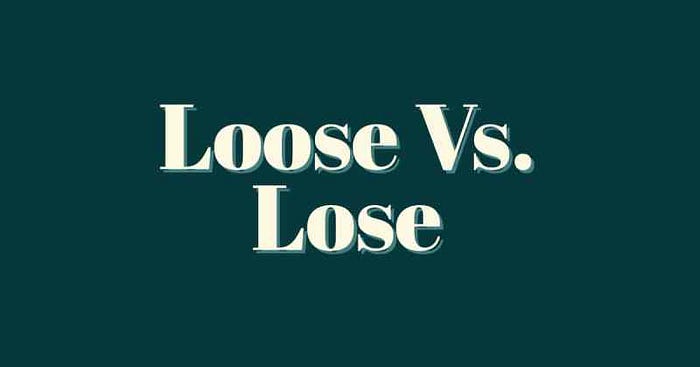Loose vs Lose: What’s the Difference?

One factor that makes the English language challenging to learn is words that have almost identical spellings — just like loose vs lose.
At a glance, the number of letter O’s is the first thing you notice. But the difference between loose and lose goes beyond that. Generally, loose is commonly used as an adjective which means not tight or securely fastened. Meanwhile, lose typically functions as a verb used when you want to express that you misplaced something or fail to win.
Loose vs. Lose: the difference
It can be tricky, but there are ways to differentiate between “lose” vs “loose”. One is by noticing the O’s in their spelling. Delving deeper, another way to distinguish which word to use is their function in English grammar.
Another way is to seek the antonym of both words to determine which is proper to use in a sentence. When your team is not the winner, then they are the loser. If you don’t want to misplace your wallet, it means you don’t like to lose it. Meanwhile, when something is not tight, it is loose. And when a dog is unrestrained, it is let loose to run around. As you can observe, the meaning of “lose” and “loose” differs.
Definition of Loose
We define “loose” by its function in English grammar. It is mostly used as an adjective and rarely as a verb or adverb.
Loose as an adjective
Loose functions as an adjective meaning various things, depending on the context of its usage in a sentence.
As an adjective, loose could mean not tight or not securely fastened, as in The screws of his bike were loose, making it prone to accident.
When describing a piece of clothing that is not fitting, you could say that The shirt is too loose for me, as if I’m drowning in fabric.
Loose as an adjective also means imprecise, inexact, or approximation of something. Take this sentence as an example:
I can give you a loose translation of this text from Mandarin to English if you could give me a loose estimate of my roof replacement cost.
Furthermore, it could describe being flexible or relaxed, like in this sentence: I’m on vacation leave, and I intend to turn off my email notifications to hang loose.
Lastly, loose could have a negative connotation and describe when someone lacks restraint, a sense of responsibility, or self-control. For example, He turns into a loose person every time he consumes alcohol.
Loose as a verb
The word “loose” is quite rare as a verb. Its common verb usage means an act of untightening something, setting free, or releasing.
Examples of loose as a verb:
- Don’t let the cows loose from the farm. It will be hard to gather them back.
- I loosed my grip on the salad bowl and dropped it.
The adverb form of loose
The adverb form of loose is “loosely”. It means a way or manner that something is not firmly held or fixed or does not fit closely or properly.
Examples of loosely in a sentence:
- Let the curtains hang loosely to block the harsh sunlight.
- I returned the prom dress I ordered because it fit me loosely.
More uses of loose
Loose is also used as a noun phrase. It means that it functions as the subject of a sentence instead of an adjective.
Examples of loose as a noun phrase:
- There are loose crocodiles in the area, so make sure your pets stay indoors.
- The loose adaptation of the classic novel hits the cinema next week.
- Her loose tooth was bothering her.
Another function of loose is forming compound verbs. Compound verbs are the result of combining multiple words to create a new meaning of an action word.
Examples of loose as a compound verb:
- We let loose on the weekend and went on a road trip
- After years of suffering, she finally broke loose from her abuser.
Let loose is a casual phrase that means to relax, while broke loose is getting away or having freedom from someone.
Definition of Lose
Differentiating lose and loose could be easy if you remember that lose usually functions as a verb.
Lose as a verb
The verb lose means misplacing or being unable to find something.
For example: Don’t lose your wallet here, for it would be impossible to retrieve it.
In the context of a sports game, challenge, or any competition, the definition of lose is failing to win.
For example: The children lose a game of charades just by a couple of points.
The gerund form of lose
A gerund noun form of a verb conjugated by adding -ing at the end of a verb. The gerund form of lose is losing. Since it is a noun, it must function as a subject or object of the verb in a sentence.
Examples of losing as a gerund:
Losing the expensive engagement ring is her greatest fear.
In this sentence, losing functions as the subject of the sentence.
He won the chess competition when they played online. However, after they played the game in person, he ended up losing the championship.
Meanwhile, losing in this sentence functions as the object of the verb ended up.
When losing or loosing becomes confusing, remember that losing is the proper word to use when you want to mean suffering from defeat or misplacing something.

Phrases That Use Loose and Lose
Another way of knowing the difference between loose vs lose is understanding their meaning in phrases, idioms, and expressions.
Phrases That Use Loose
- Loose connection — pertains to electric wiring that is defective
The loose connection of cable wires is a fire hazard.
- Loose-leaf — is a type of notebook with loose sheets of paper; sheets that are not glued on the spine of a notebook.
I prefer using loose-leaf notebooks when writing my essays.
- Loose change or loose coins — refers to coins collected from spending a bill or coins lying around an area. As an idiomatic expression, loose change means something of little value or insignificant.
The loose change / loose coins in my pocket amounted to twenty dollars.
The budget allocated for this charity event is a loose change compared to their marketing budget.
- Screw loose — is informal English with a negative meaning; it describes someone who is not in the proper state of mind or is unstable.
I’m unsure if he is just being goofy or has some screw loose for acting that way.
- Loose cannon — describes someone or something dangerous or unpredictable.
He is seen as a loose cannon for being in and out of the prison.
- Loose-lipped– someone who overshares information and is talkative.
Avoid sharing your secret with him because he’s a loose-lipped person.
Phrases That Use Lose
- Lose sight of something — means one’s sense of direction gets blurry; it also means failing to remember or consider.
Don’t lose sight of your goal even when there are a lot of distractions.
- Lose sleep over — worry too much that you cannot sleep
Get over it and don’t lose sleep over what she said. It’s her stress that’s talking.
- Lose it or Lose one’s temper — to lose composure because of anger.
He loses it, seeing the files he arranged scattered on the floor.
He loses his temper seeing the files he sorted scattered on the floor.
- Lose face — being humiliated; to lose respect from other people.
As the secretary of justice, he loses face when his son is caught in a drug buy-bust operation.
- Lose heart — become discouraged over something.
This dire situation would make her lose her heart and give up.
- Lose count — forgetting the amount or total of something
The merchandiser loses count of the items every time someone disturbs him.
How to Use Loose vs. Lose in a Sentence
Knowing the parts of speech (i.e., verb, adjective, noun, etc.) is crucial in determining the proper usage of lose vs loose. Let’s examine the following famous quotes and observe how those words are used.
Examples of Loose
“Poetry is not a turning loose of emotion, but an escape from emotion; it is not the expression of personality, but an escape from personality.” ― T. S. Eliot
“If a man paints a target on his chest, he should expect that sooner or later someone will loose an arrow on him.” ― George R.R. Martin, A Game of Thrones
How many things are now at loose ends! Who knows which way the wind will blow tomorrow?
― Henry David Thoreau
Examples of Lose
“Rushing into action, you fail.
Trying to grasp things, you lose them.
Forcing a project to completion,
you ruin what was almost ripe.” ― Lao Tzu, Tao Te Ching
“In the English language there are orphans and widows, but there is no word for the parents who lose a child.” ― Jodi Picoult, My Sister’s Keeper
“I cannot lose the one thing that keeps me alive : hope .” ― Paulo Coelho, Like the Flowing River

Loose vs. Lose: the synonyms
Synonyms are words with nearly or exactly the same meaning. To know the difference between lose and loose meaning, let’s see the text below:
Lose vs Loose Meaning Through Synonyms
Lose — misplace, no longer have, forget, fail, not win, elude, evade, become free of something
Loose — baggy, not fitted, lax, relaxed, detached, untighten, unclasped, at large
Lose used in sentences
Lose meaning misplace, or no longer have in a sentence:
I don’t want to lose something, so I check my purse every time I leave a place.
I don’t want to lose her.
Lose meaning forget in a sentence:
I lose count of the times I have to remind her to drink her vitamins today.
Lose meaning fail or not win in a sentence:
They lose playing a virtual game of tennis moments ago.
Lose meaning elude, evade, or become free of something in a sentence:
I did not head home immediately because I was trying to lose the car following me.
Loose used in sentences
Loose meaning baggy or not fitted in a sentence:
I like wearing loose shirts when I’m home alone.
Loose means lax or relaxed in a sentence:
Let’s get loose tonight and unwind from the stress of the week.
Loose meaning detached, untighten, or unclasped in a sentence:
There’s a loose screw on my cabinet that I have to fix.
Loose meaning at large in a sentence:
The criminal that has been on the loose for a month was caught by the police yesterday.
Looser or loser
Although looser or loser sounds the same, the two words have different meanings. Looser is the comparative degree of the adjective loose. It functions to compare two things: Even though she works out, her grip is looser than mine because I didn’t drop the vase while she did.
Loser functions as a noun describing someone who did not win and was defeated or failed at something. For example, The loser of the bet will treat everyone to lunch.
How to Remember the Difference
Loose vs lose are words with almost identical spellings but have separate meanings. When English learners use those words when writing, they might commit spelling errors unless they have grammar checkers.
The good thing is grammar experts devised a way to know when to use those words. Remember that if it has one O (lose), it functions mainly as a verb, while if it has two O’s, it is an adjective. When you remove one O from loose, it means you misplaced something (lose). If you add one O from lose, you’re describing something that is not tight (loose).

Conclusion
Since English is a tricky language to learn, embarrassing blunders like mistaking lose for loose are committed by English learners and native English speakers alike. The trick is to remember that lose mainly functions as a verb, meaning misplacing something or failing to win. Loose, on the other hand, is commonly used as an adjective describing unfastened, not tight, and relaxed things.
Frequently Asked Questions:
Is lose the same as loose?
Lose is not the same as loose, although they sound the same. Lose functions as a verb, while loose is an adjective. As a verb, lose means to misplace or forget. In comparison, loose functions as an adjective meaning unsecured or unfastened. Lose is the opposite of find, while tight is the opposite of loose.
Is it loose or lose yourself?
The correct expression is lose yourself. To lose yourself in something means you concentrate on an activity or person that you forget about your environment, current situation, or people around you. The examples of “lose” yourself in a sentence are the following:
Sometimes you lose yourself while working and forget to eat your meals.
Don’t lose yourself in love to the extent that you can’t function without your partner.
How do you use loose and lose in a sentence?
Since loose is an adjective, you use it in front or before a noun to describe it. For example: The jar’s cover is loose. The noun phrase in the sentence is the jar’s cover followed by the adjective loose.
Meanwhile, lose is a verb, so you use it in a sentence to show the action of the noun or subject of the sentence. For example: He loses his cool when someone insults his wife. The verb phrase “loses his cool” shows the action of the subject he.
How do you remember loose or lose?
You can use the O’s in the word to remember which among loose or lose to use in a sentence. One O (lose) is a verb, while two O’s (loose) is an adjective. When you can’t find something, you lose it. If something is not fit or is not tight, it is loose.
What is the difference between loose loss and lose?
Loose is an adjective, loss is a noun, and lose is a verb. They function differently in the parts of speech. As an adjective, loose describes something that is unfastened. Loss as a noun could mean death as in suffering the loss of her child. Aside from that, loss as a noun generally means the process of losing something (e.g., loss of income, at loss for words).
How do you use loose in a sentence?
Loose is an adjective used to describe something in a sentence.
What is the past tense of loss?
Loss is actually a noun that means the fact or process of losing something. Therefore, loss doesn’t have a past tense. However, in English, words undergo conjugation to form new ones. An example of this process is verbification. Verbification is the process of converting a noun into a verb. Loss is a noun that is “verbified” into lose, and the past tense of lose is lost.
Loose vs lose weight?
Since weight cannot be unfastened, unclasped, or untightened, the proper expression is lose weight. Remember that one of the synonyms of lose is to become free of something. If you want to become free of unhealthy fats or calories, you need to lose weight.

Learn from History — Follow the Science — Listen to the Experts
What’s the one thing that makes LillyPad so special? Lilly! She is a personal English tutor, and has people talking all over the world! Lilly makes improving your English easy. With Lilly, you can read in four different ways, and you can read just about anything you love. And learning with Lilly, well that’s what you call liberating!
For learners of all ages striving to improve their English, LillyPad combines the most scientifically studied and recommended path to achieving English fluency and proficiency with today’s most brilliant technologies!
Additionally, the platform incorporates goal-setting capabilities, essential tracking & reporting, gamification, anywhere-anytime convenience, and significant cost savings compared to traditional tutoring methodologies.
At LillyPad, everything we do is focused on delivering a personalized journey that is meaningful and life-changing for our members. LillyPad isn’t just the next chapter in English learning…
…it’s a whole new story!
Do you want to improve your English? Visit www.lillypad.ai.
Follow us on Facebook or Instagram!

